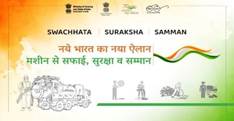
Today, Urban India has recommitted itself towards ensuring the safety, dignity, and security of all sanitation workers (SafaiMitras). For the first time, 500 cities across India have declared themselves as ‘SafaiMitra Surakshit Shehar’. In doing so, they have established that the cities are able to achieve adequacy in terms of institutional capacity, manpower and equipment norms as stipulated by MoHUA and are providing safe working conditions for SafaiMitras. The ‘SafaiMitra Surakshit Shehar’ declaration done by 500 cities aligns with Swachh Bharat Mission-Urban’s longstanding goal of promoting sustainable sanitation practices and acting as a catalyst for the transformation of every ‘manhole’ into a ‘machine hole’.
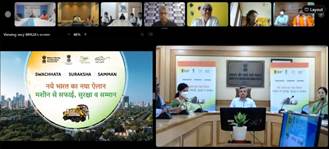
Shri Manoj Joshi, Secretary, Ministry of Housing and Urban Affairs (MoHUA), and Shri R. Subrahmanyam, Secretary, Ministry of Social Justice and Empowerment (MoSJE) jointly chaired the webinar which was attended by State Mission Directors of SBM-U, as well as Commissioners of leading cities in this initiative including AMRUT (Atal Mission for Rejuvenation and Urban Transformation) Cities.
Congratulating States and cities for their efforts, Shri Manoj Joshi and Shri. R. Subrahmanyam highlighted the need for all cities and States to remain committed to the cause of ‘SafaiMitra Suraksha’. To provide impetus to the ongoing efforts towards mechanization and safety of workers, both Ministries jointly launched ‘NAMASTE’ (National Action for Mechanized Sanitation Ecosystem) Scheme to enhance occupational safety, improved access to safety gears and machines, provide skilled wage opportunities, and focus on continuous capacity building while breaking the intergenerationality of sanitation work.

Talking about the newly launched ‘NAMASTE’ Scheme, Shri R. Subrahmanyam highlighted the need for Municipal Corporations to lead all ‘SafaiMitra Suraksha’ initiatives. Highlighting the support that MoSJE would be providing, he said, “MoSJE will assist in the setting up Project Management Units (PMUs) that will be equipped with special resources and skilled professionals. Today, 128 out of 500 AMRUT cities have declared themselves as ‘SafaiMitra Surakshit Shehar’, tomorrow all 500 must become so. My request to all of you is to take this forward and make it a reality. Together we will succeed."
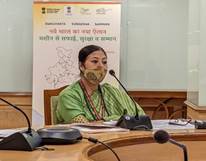
Ms. Yogita Swaroop, Senior Economic Advisor, MoSJE further presented the tenets of NAMASTE. The Scheme will focus on surveying sewer/septic tank workers, skilling, and entrepreneurship programme support to dependants of SafaiMitras, capacity building towards taking on alternative trades, capital subsidy for procurement of sanitation-related vehicles and equipment, as well as linking SafaiMitras with health insurance.
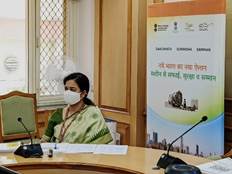
Speaking at the virtual event, Ms. Roopa Mishra, Joint Secretary and Mission Director, Swachh Bharat Mission-Urban, Ministry of Housing and Urban Affairs (MoHUA) recounted the decades-long journey that Indian cities have traversed in order to declare themselves as ‘SafaiMitra Surakshit’. She said, “The Government is committed to ensuring ‘Zero Fatalities in Sanitation Work’. On World Toilet Day in 2019, MoHUA launched the ‘SafaiMitra Suraksha Challenge’ through which we identified 100 Lighthouse cities that were well equipped in terms of sanitation infrastructure and facilities. MoHUA also provided a protocol for ‘SafaiMitra Surakshit Shehar’. States have set up Responsible Sanitation Authorities (RSAs) & Emergency Response Sanitation Units (ESRUs) at the district level and are now prioritizing training and capacity building of SafaiMitras. It has taken 75 years for us to come to this juncture, but any task started well is bound to achieve its goal. MoHUA is committed to ensure that all Indian cities declare themselves as ‘SafaiMitra Surkashit’ by March 2024.”
Of the 100 Lighthouse Cities, 94 have declared themselves as SafaiMitra Surakshit. Apart from these, 406 other cities have also declared themselves, with more continuing to do so. The self-declaration of these cities will be followed by a validation by the local political leadership of the city after which MoHUA will engage with an independent third party for validation.
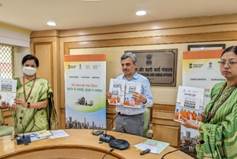
Shri. Manoj Joshi along with dignitaries also launched three compendiums developed with support of the National Fecal Sludge and Septage Management (NFSSM) Alliance titled, ‘Lighthouse Cities: SafaiMitra Suraksha Ki Misaal’, ‘Best Practices from India Cities: SafaiMitra Suraksha aur Samman’, and ‘SafaiMitra Speak: Badlaav Ki Kahaani’.
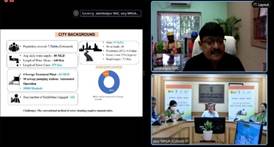
The cities of Jamshedpur, Dewas, Tirupati, Bhubaneswar presented their experiences on making their cities with ‘SafaiMitra Surakshit’. Shri. Sanjay Kumar, Special Officer, Jamshedpur Notified Area Committee highlighted Jamshedpur’s, (Jharkhand) commitment for workers safety. The city had conducted an examination of the estimation of oxygen at different depths of sewer holes, studied the effectiveness of their manual cleaning processes, as well as estimated the need for different sewers to be cleaned at different frequencies. The city has made concerted efforts to transition towards transforming manholes into machine holes with regular health check-ups for SafaiMitras, safety training programmes, and citizen awareness against manual cleaning.
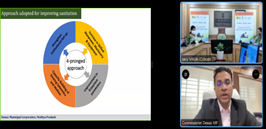
Shri Vishal Singh, Commissioner, Dewas Municipal Corporation (Madhya Pradesh), described their four-pronged strategy adopted for institutional upgradation, skill building, citizen awareness, and holistic ecosystem upgradation. Th city appointed technical supervisors as part of the sewer cleaning team, ensured availability of quality assurance engineers, procured appropriate equipment and also integrated informal workers with the Sewerage Maintenance Agency. Dewas has declared itself as a ‘SafaiMitra Surakshit Shehar’.
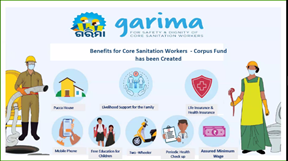
Shri Vijay Amruta Kulange, Commissioner, Bhubaneswar Municipal Corporation, highlighted the impact that the ‘GARIMA’ scheme has had on SafaiMitra well-being. Under the Scheme, SafaiMitras are divided into Grade I (highly skilled) and Grade II (skilled) categories, each with their own set of activities and fee rates. The scheme provides for social security benefits and also distributes unique identity cards to SafaiMitras. Garima Grihas, which are resting lounges with personal lockers, and washrooms, have also been established.
Deputy Commissioner of Tirupati, Shri Chandramouleeswar Reddy shared that a dedicated team of 96 SafaiMitras has been trained to carry out mechanized cleaning. The city is supporting them by extensively procuring mechanised equipment in the last one year. All vehicles are geo-tagged to track and ensure sludge is brought to the Fecal Sludge Treatment Plants for treatment. Additionally, integrated Command and Control centres run by the Corporation help prevent incidences of hazardous practices.


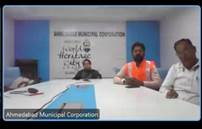
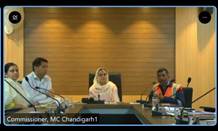
SafaiMitras Shri Jeetendra Kumar, from Ahmedabad, Shri Subhash from Chandigarh, Shri Aakash Ram from Gaya, and Shri Rajesh Rao from Navi Mumbai shared their experiences of working in the field of sanitation with the audience. They highlighted improvement in working conditions in their respective cities and commended their respective Municipal Corporations for creating a safe working ecosystem for SafaiMitras.
Organizations doing work to strengthen SafaiMitra Suraksha such as Urban Management Centre (UMC), Kam-Avida, as well as Dalit Indian Chamber of Commerce and Industry (DICCI) delivered presentations on work being done by them.
For regular updates, please follow the Swachh Bharat Mission’s official website and social media properties:
Facebook:Swachh Bharat Mission - Urban | Twitter: @SwachhBharatGov |
YouTube: Swachh Bharat Mission-Urban | Instagram:sbm_urban
***
YB/BK